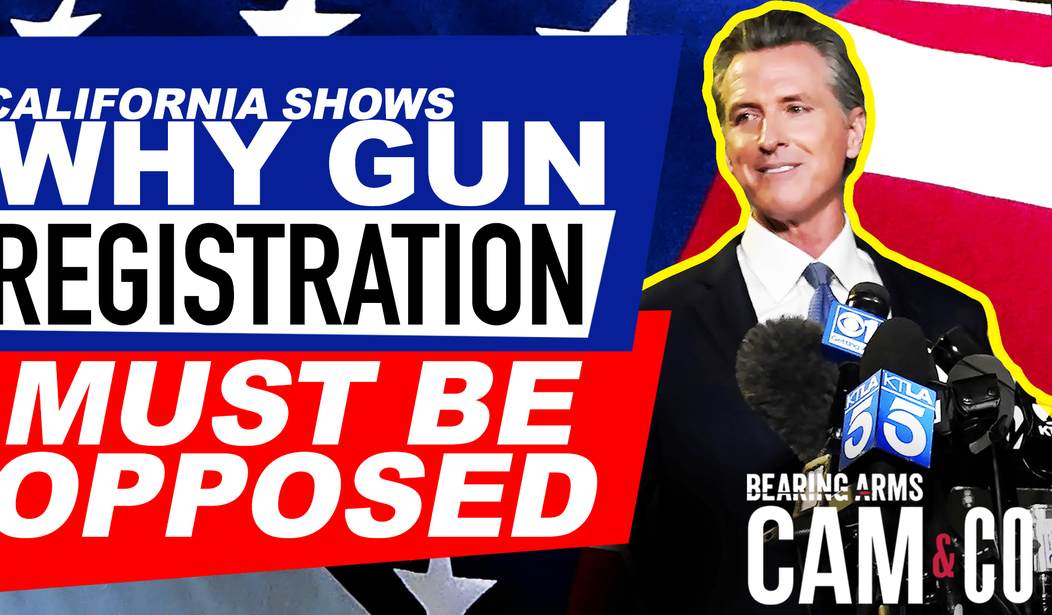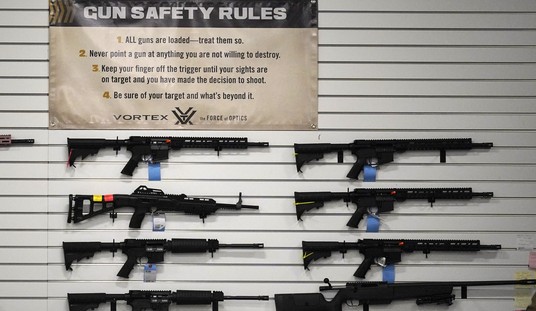The bad news about California’s AB 173 keeps coming. First the was the introduction of the bill itself, which allows for the release of all kinds of information about gun owners, including their personal identities, to academics investigating “gun violence.” Then the bill passed out of the legislature and landed on Gavin Newsom’s desk. Shortly thereafter, Newsom put pen to paper and signed the bill into law, and since it’s a budget bill, it takes effect immediately.
All that is bad enough, but as Armed American Radio host Mark Walters tells me on today’s Bearing Arms’ Cam & Co, it’s also going to be extremely difficult to challenge the new law in court. And compounding the danger to gun owners, it’s also quite likely that we’ll see Democrats in Congress attempt to pull a similar move now that the CDC director has decided to make “gun violence prevention” a top priority of the agency (I guess that COVID stuff is all under control).
Walters says that the challenge in bringing a lawsuit against the new law comes from the fact that a plaintiff is going to have to show that they’ve been harmed by the release of their identifying information. The reality is that most California gun owners won’t know if their information has been accessed by researchers or for what purpose. I suppose it might be possible to file a Freedom of Information Act request to determine what materials have been released to particular researchers, but I wouldn’t be surprised if California law gives more privacy rights to those accessing the personal information of gun owners than to gun owners themselves.
Of course, it’s also possible that an unscrupulous researcher with an axe to grind decides to do a mass doxxing of gun owners, or hackers gain access to the files of researchers and publicly post the details of California gun owners, but Walters says that short of something like that happening, the legal bar to show actual harm is going to be hard to meet.
The sad thing is that this bill could have easily been written in such a way to ensure that academics only had access to aggregate information, or even non-identifying details of specific transactions. Instead, California’s anti-gun lawmakers went out of their way to ensure that the personal info of legal gun owners would be available for academics to inspect.
Walters also wonders how useful this research could actually be, given that the vast majority of California’s gun owners will never be involved in an act of “gun violence,” be it a shooting, negligent discharge, or a suicide. After all, if the goal of this research is to prevent gun violence, shouldn’t these anti-gun academics actually be focusing on the individuals who broke all of California’s gun control laws and illegally obtained and used a gun to commit an act of violence?
This law would be bad enough if it were confined to California, but as gun owners know the gun control plans that come to fruition there tend to spread like weeds through the country. It’s not hard to imagine similar legislation being introduced in states like Illinois, New York, Massachusetts, New Jersey, Hawaii, and Connecticut; all of which have gun registration/licensing requirements just to keep a firearm in the home. In fact, I’m pretty sure we’ll see bills introduced in several of these states in time for the next legislative session.
Then there’s the federal government. We’ve already seen how easy it is to tuck anti-gun provisions into massive budget bills, so what’s to stop anti-gun Democrats from providing a few million dollars in grants to states that share their licensing and registration information to the CDC in order to help the agency research “gun violence”? Heck, what’s to stop Democrats from simply demanding that states with gun registration and licensing share that data with the CDC?
This is a major problem, and Walters says the only real chance for relief before the midterms would be a sweeping decision by the Supreme Court in the New York carry case that will be heard in November. A decision broad enough to strike down all licensing and registration laws would make the California “Invasion of Gun Owners’ Privacy Act” a moot point, but honestly, I doubt that the ruling is going to be that broad, particularly given the fact that the Court has framed the question it’s going to answer fairly narrowly. However, there’s also the Young case out of Hawaii that’s currently under consideration by the Court, and if they eventually grant cert in that case I’d say gun owners have a much better chance of a more sweeping ruling.
Mark Walters believes that California’s new law should be a warning to gun owners in those states that don’t have registration or licensing regimes in place, as well as an alarm bell for those Californians who value both their Second Amendment rights and their own personal privacy. I can’t argue with his position, unfortunately.









Join the conversation as a VIP Member